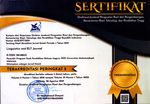Challenges in Pronouncing English Consonant Fricatives: Insights from Indonesian EFL Learners
Abstract
Keywords
Full Text:
PDFReferences
S. Luthfianda, Y. Irawan, R. Rahayu, and S. Hidayat, “Exploring pronunciation challenges: Indonesian university students’ production of English fricative sounds,” English Review: Journal of English Education, vol. 12, no. 1, pp. 85–94, 2024, doi: 10.25134/erjee.v12i1.7606.
H. Fraser, Teaching Pronunciation: A Guide for Teachers of English as a Second Language. Catalyst Interactive, 2001.
S. Johansson, “Contrastive analysis and learner language: A corpus-based approach,” 2018.
J. J. Situmorang, Y. Lubis, and R. F. Y. Lubis, “Phonological Challenges and Error Patterns in English Consonant Production by Indonesian Learners: A Literature Review,” Jurnal Pendidikan Dan Sastra Inggris, vol. 3, no. 2, pp. 63–70, 2023, doi: 10.55606/jupensi.v3i2.1986.
R. Wardhaugh, An Introduction to Sociolinguistics, 6th ed. Wiley-Blackwell, 2010.
L. Selinker, “Interlanguage,” IRAL - International Review of Applied Linguistics in Language Teaching, vol. 10, no. 1–4, pp. 209–231, 1972, doi: 10.1515/iral.1972.10.1-4.209.
P. Ruengwatthakee, “Improving Thai College Students’ English Fricative Sounds through Storytelling,” Journal of Universality of Global Education Issues, vol. 7, no. 1, 2021, [Online]. Available: https://ugei-ojs-shsu.tdl.org/ugei/article/view/42
A. R. M. Altakhaineh, M. Y. Alsaraireh, and H. Alhendi, “The Impact of Incidental Learning on the Acquisition of the Sound /p/ by Arabic-Speaking EFL Learners,” Explorations in English Language and Linguistics, vol. 10, no. 1, pp. 51–65, 2022, doi: 10.2478/exell-2022-0010.
F. Z. Fadhly, Y. Yuniarti, and F. Apriyani, “Exploring Labiodental Consonant Pronunciation Challenges Faced by Sundanese EFL Learners: Effective Strategies for Improvement,” Journal of English Language Teaching and Linguistics, 2022, doi: 10.21462/jeltl.v7i3.1042.
A. P. Gilakjani, “English Pronunciation Instruction: A Literature Review,” International Journal of Research in English Education, vol. 1, no. 1, pp. 1–6, 2016, [Online]. Available: https://ijreeonline.com/article-1-21-en.html
Z. Zhao, “Error Analysis and Implications of Chinese Students’ English Writing Based on Computer Scoring System,” Advances in Education, Humanities and Social Science Research, vol. 11, no. 1, 2024, doi: 10.56028/aehssr.11.1.58.2024.
J. C. Mora and I. Mora-Plaza, “From Research in the Lab to Pedagogical Practices in the EFL Classroom: The Case of Task-Based Pronunciation Teaching,” Educ Sci (Basel), vol. 13, no. 10, p. 1042, 2023, doi: 10.3390/educsci13101042.
A. Wirana, Lestari, and Lubis, “The Role of English Consonants in Language Development: Acquisition and Articulation,” Jurnal Multimedia (MUDE), vol. 2, no. 3, 2023, doi: 10.37576/mude.v2i3.4393.
D. J. Tišma, “Can Audio-Visual Training Equally Affect Phonemic and Phonetic Contrasts? An Example of L2 Fricative Production,” NASKG, vol. 48, p. 317, 2021, doi: 10.46793/naskg2148.317jt.
R. P. Octaviani, L. M. Jannah, and M. Sebrina, “The impact of first language on students’ English pronunciation,” International Journal of Indonesian Education and Teaching, vol. 8, no. 1, pp. 164–173, 2024, doi: 10.24071/ijiet.v8i1.6758.
N. Ulfayanti and M. O. Jelimun, “Contrastive analysis of English and Indonesian vowel phonemes and its lesson plan in language teaching,” Journal of Applied Studies in Language, vol. 2, no. 2, pp. 116–123, 2018, [Online]. Available: https://ojs.pnb.ac.id/index.php/JASL/article/view/1030
M. H. Naji and A. Y. Almakrob, “Arabic-speaking EFL learners’ pronunciation of British English vowels: A production-based study,” Journal of Language Teaching and Research, 2023, doi: 10.17507/jltr.1403.21.
J. Gordon and R. S. Arias, “‘The Most Important Thing is to Make Them Aware’: A Case Study of Teacher Metalanguage Knowledge and Explicit L2 Pronunciation Instruction,” TESOL Quarterly, 2024, doi: 10.1002/tesq.3301.
S. F. Jahara and A. A. Hussein, “Pronunciation Problems Encountered by EFL Learners: An Empirical Study,” AWEJ Journal, vol. 12, no. 12, 2021, doi: 10.24093/awej/vol12no4.14.
J. Fouz-González and J. A. Mompean, “Exploring the Potential of Phonetic Symbols and Keywords as Labels for Perceptual Training,” Stud Second Lang Acquis, vol. 43, no. 2, pp. 297–328, 2021, doi: 10.1017/S0272263120000455.
A. Al Aufi, S. Naqvi, V. R. Naidu, and Y. Al Homani, “Integrating HTML5-Based Speech Recognition with a Learning Management System to Enhance EFL Learners’ Pronunciation Skills,” Journal of Teaching English for Specific and Academic Purposes, 2023, doi: 10.22190/jtesap230621038a.
G. N. Leite and R. A. Faciola, “Pronunciation Challenges Faced by Brazilian EFL Learners,” Peer Review, 2023, doi: 10.53660/701.prw2207.
DOI: https://doi.org/10.31764/leltj.v12i2.27679
Refbacks
- There are currently no refbacks.
Copyright (c) 2024 Ristati Ristati, Bahing Bahing, Olga Dona Retsi, Tutik Haryani, Novika Amalia

This work is licensed under a Creative Commons Attribution-ShareAlike 4.0 International License.
_____________________________________________________
Linguistics and ELT Journal
p-ISSN 2339-2940 | e-ISSN 2614-8633

LELTJ is licensed under a Creative Commons Attribution-ShareAlike 4.0 International License.
_____________________________________________________
LELTJ is abstracting & indexing in the following databases:
_____________________________________________________
LELTJ Editorial Office:













